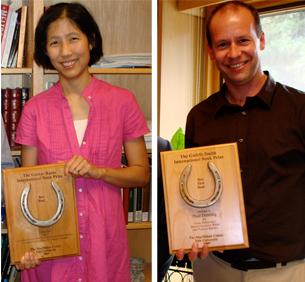
Thad Dunning, Associate Professor of Political Science, has been awarded the 2009 Gaddis Smith International Book Prize for best first book for Crude Democracy: Natural Resource Wealth and Political Regimes (Cambridge University Press, 2008). Tina Lu, Professor of Chinese Literature, has been awarded the 2009 Gustav Ranis International Book Prize for best book for Accidental Incest, Filial Cannibalism and Other Peculiar Encounters in Late Imperial Chinese Literature (Harvard University Asia Center, 2008).
Established in 2004 to recognize the distinguished legacy of two former Directors of the MacMillan Center, the prizes are awarded for books on international topics written by current members of the Yale faculty. Award recipients receive a research appointment at the MacMillan Center, and a $10,000 research award over two years.
Using game-theoretic tools and statistical modeling as well as detailed country case studies and drawing on fieldwork in Latin America and Africa, Crude Democracy builds and tests a theory that explains political variation across resource-rich states. According to the judging panel, Crude Democracy was chosen because of “its innovative treatment of a major issue of contemporary relevance; its clear writing; and its ambitious transnational scope. It compellingly challenges conventional political science assumptions that natural resource wealth and political democracy are antithetical, and it does so by a well-informed comparative analysis that ranges from Venezuela to Chile, and from Bolivia to Ecuador and Botswana.”
In Accidental Incest, Filial Cannibalism and Other Peculiar Encounters in Late Imperial Chinese Literature, Lu challenges the reader to think about politics, domestic issues, markets, and kinship in order to make sense of a long Chinese literary tradition. The judging panel was “impressed by its interdisciplinary approach,” and “its excellent use of anthropology and political theory as well as literature.” The work begins with a vivid and stunning problem – the refusal of a father to give permission to marry to two young lovers who are also siblings. This dilemma is the introduction to a discussion of politics and of the politics of incest. The book examines the relationships among individual families and the implications of those relationships for the state.
